C语言~所有的字符串操作函数
c语言字符串操作函数统计子字符串出现的次数
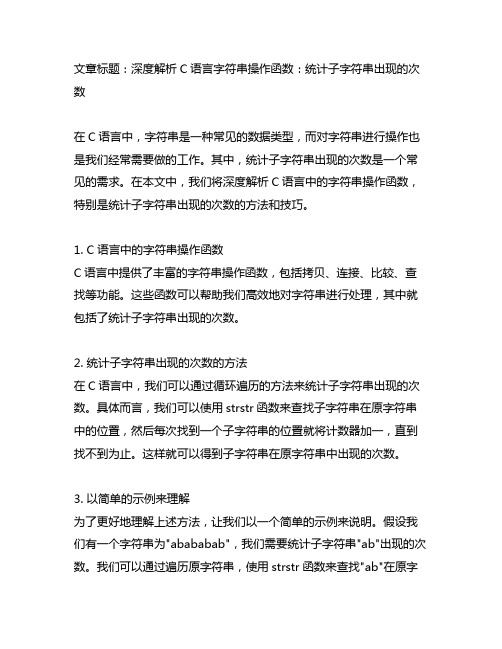
文章标题:深度解析C语言字符串操作函数:统计子字符串出现的次数在C语言中,字符串是一种常见的数据类型,而对字符串进行操作也是我们经常需要做的工作。
其中,统计子字符串出现的次数是一个常见的需求。
在本文中,我们将深度解析C语言中的字符串操作函数,特别是统计子字符串出现的次数的方法和技巧。
1. C语言中的字符串操作函数C语言中提供了丰富的字符串操作函数,包括拷贝、连接、比较、查找等功能。
这些函数可以帮助我们高效地对字符串进行处理,其中就包括了统计子字符串出现的次数。
2. 统计子字符串出现的次数的方法在C语言中,我们可以通过循环遍历的方法来统计子字符串出现的次数。
具体而言,我们可以使用strstr函数来查找子字符串在原字符串中的位置,然后每次找到一个子字符串的位置就将计数器加一,直到找不到为止。
这样就可以得到子字符串在原字符串中出现的次数。
3. 以简单的示例来理解为了更好地理解上述方法,让我们以一个简单的示例来说明。
假设我们有一个字符串为"abababab",我们需要统计子字符串"ab"出现的次数。
我们可以通过遍历原字符串,使用strstr函数来查找"ab"在原字符串中的位置,并进行计数,最终得到子字符串"ab"在原字符串中出现的次数。
4. 总结与回顾通过本文的介绍,我们了解了C语言中统计子字符串出现次数的方法,以及如何使用字符串操作函数来实现。
这些技巧在实际的编程工作中是非常有用的,尤其是在需要对大量文本进行处理时。
5. 个人观点和理解个人认为,对于C语言中的字符串操作函数,尤其是统计子字符串出现次数的需求,我们需要充分了解和掌握相关的函数和方法。
只有深入理解了这些技巧,才能更好地应用于实际的项目开发中。
在知识的文章格式中,以上内容将更加详细地展开并用具体的代码示例来说明。
希望能帮助你更好地理解C语言中的字符串操作函数,并能够熟练地处理统计子字符串出现的次数的需求。
c语言 str函数

c语言 str函数Str函数是C语言中最常用的字符串处理函数之一。
它可以用来完成不同字符串操作任务,例如截取、查找、连接等。
本文将详细阐述Str函数的几个主要功能以及它们的使用方法。
1、获取字符串长度获取字符串长度是Str函数中使用最频繁的一项操作。
在C语言中,可以使用strlen函数获取字符串的长度。
该函数声明如下:```size_t strlen(const char *str);```该函数接受一个字符串作为参数,返回该字符串的长度(以字节为单位)。
下面是一个简单的例子:```#include <stdio.h>#include <string.h>int main() {char str[50] = "Hello, world!";printf("Length of string '%s' is %d", str, strlen(str)); return 0;}```输出:```Length of string 'Hello, world!' is 13```2、查找字符串中的字符查找字符串中的字符是另一个常见的字符串操作。
在C语言中,可以使用strchr函数查找字符串中第一次出现某个字符的位置。
该函数声明如下:```char *strchr(const char *str, int c);```该函数接受一个字符串和一个字符作为参数,返回指向第一次出现该字符的指针。
如果未找到该字符,则返回NULL。
下面是一个简单的例子:```#include <stdio.h>#include <string.h>int main() {char str[50] = "Hello, world!";char *result = strchr(str, 'o');if (result) {printf("Character 'o' found at position %d", result - str);} else {printf("Character not found");}return 0;}```输出:```Character 'o' found at position 4```3、复制字符串复制字符串是另一个常用字符串操作,可以使用strcpy函数完成。
c语言string()的用法

C语言string()的用法1.简介在C语言中,字符串是一系列字符的集合,常用的字符串操作包括拷贝、连接、长度计算等。
C语言提供了一系列的库函数来方便地操作字符串,其中`s tr in g()`函数是一个重要的函数之一。
本文将详细介绍`s tr in g()`函数的用法及示例。
2.函数概述`s tr in g()`函数用于对字符串进行各种操作,包括拷贝、连接、比较等。
其函数原型如下:#i nc lu de<s tr in g.h>c h ar*s tr in g(ch ar*d es t,co ns tc ha r*s r c);其中,`de st`表示目标字符串的指针,`s rc`表示源字符串的指针。
该函数将源字符串中的内容复制到目标字符串中,并返回目标字符串的指针。
3.示例下面通过几个示例来演示`s tr in g()`函数的使用方法。
3.1字符串拷贝字符串拷贝是`s tr in g()`函数最常用的功能之一。
示例代码如下:#i nc lu de<s td io.h>#i nc lu de<s tr in g.h>i n tm ai n(){c h ar so ur ce[]="Hel l o,Wo rl d!";c h ar de st in at io n[20];//使用st r i ng()函数进行字符串拷贝s t ri ng(d es ti na tio n,s ou rc e);p r in tf("拷贝后的字符串:%s\n",de st i na ti on);r e tu rn0;}输出结果为:拷贝后的字符串:He l lo,W or ld!3.2字符串连接`s tr in g()`函数还可以用于字符串的连接。
示例代码如下:#i nc lu de<s td io.h>#i nc lu de<s tr in g.h>i n tm ai n(){c h ar st r1[50]="Hel l o";c h ar st r2[]="Wo rld!";//使用st ri ng()函数进行字符串连接s t ri ng(s tr1,st r1);s t ri ng(s tr1,st r2);p r in tf("连接后的字符串:%s\n",st r1);r e tu rn0;}输出结果为:连接后的字符串:He l lo Wo rl d!3.3字符串比较`s tr in g()`函数还可以用于字符串的比较操作。
C语言字符串操作

C语言字符串操作字符串是C语言中最常用的数据类型之一,用于存储和操作文本数据。
在C语言中,有多种操作和处理字符串的方法,能够实现字符串的拼接、替换、截取等功能。
本文将介绍C语言中常用的字符串操作函数,并通过实例演示它们的用法。
1. 字符串长度计算在C语言中,可以使用标准库函数strlen来计算字符串的长度。
其原型如下:```csize_t strlen(const char *str);```其中,str是要计算长度的字符串。
该函数返回的是一个无符号整数,表示字符串的长度,不包括字符串结束符'\0'。
示例:```c#include <stdio.h>#include <string.h>int main() {char str[] = "Hello, world!";int len = strlen(str);printf("字符串的长度是:%d\n", len);return 0;}```输出结果:```字符串的长度是:13```2. 字符串拼接字符串拼接是将多个字符串连接成一个字符串的操作。
在C语言中,可以使用strcat函数实现字符串的拼接。
其原型如下:```cchar *strcat(char *dest, const char *src);```其中,dest是目标字符串,src是要拼接的字符串。
该函数会将src中的内容追加到dest的末尾,并返回dest的地址。
示例:```c#include <stdio.h>#include <string.h>int main() {char str1[20] = "Hello, ";char str2[] = "world!";strcat(str1, str2);printf("拼接后的字符串是:%s\n", str1);return 0;}```输出结果:```拼接后的字符串是:Hello, world!```3. 字符串复制字符串复制是将一个字符串的内容复制到另一个字符串中的操作。
c语言常用的安全函数
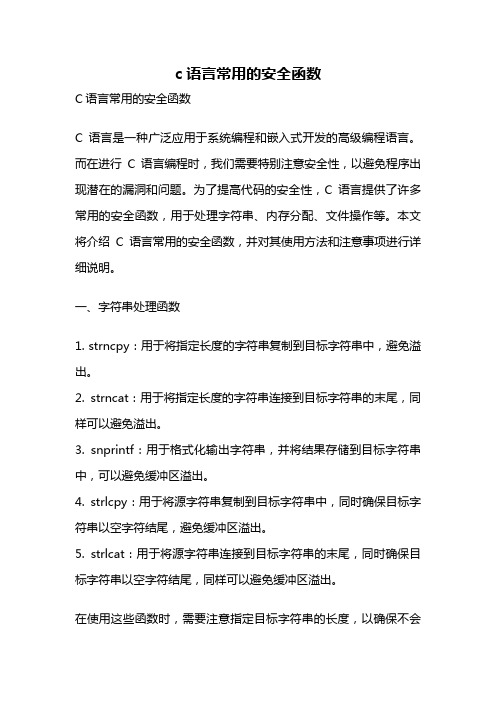
c语言常用的安全函数C语言常用的安全函数C语言是一种广泛应用于系统编程和嵌入式开发的高级编程语言。
而在进行C语言编程时,我们需要特别注意安全性,以避免程序出现潜在的漏洞和问题。
为了提高代码的安全性,C语言提供了许多常用的安全函数,用于处理字符串、内存分配、文件操作等。
本文将介绍C语言常用的安全函数,并对其使用方法和注意事项进行详细说明。
一、字符串处理函数1. strncpy:用于将指定长度的字符串复制到目标字符串中,避免溢出。
2. strncat:用于将指定长度的字符串连接到目标字符串的末尾,同样可以避免溢出。
3. snprintf:用于格式化输出字符串,并将结果存储到目标字符串中,可以避免缓冲区溢出。
4. strlcpy:用于将源字符串复制到目标字符串中,同时确保目标字符串以空字符结尾,避免缓冲区溢出。
5. strlcat:用于将源字符串连接到目标字符串的末尾,同时确保目标字符串以空字符结尾,同样可以避免缓冲区溢出。
在使用这些函数时,需要注意指定目标字符串的长度,以确保不会发生缓冲区溢出的情况。
二、内存分配函数1. calloc:用于在内存中分配指定数量的连续字节,并将其初始化为零。
这样可以避免使用未初始化的内存。
2. malloc:用于在内存中分配指定数量的连续字节,但不进行初始化。
在使用malloc分配内存时,需要注意在使用完毕后,及时使用free函数释放内存,避免内存泄漏问题。
3. realloc:用于重新分配之前分配的内存块的大小。
这个函数可以用于扩大或缩小内存块的大小。
同样需要注意在使用完毕后释放内存。
使用这些函数时,应该确保分配的内存足够,并且在使用完毕后及时释放内存,以避免内存泄漏和指针悬挂的问题。
三、文件操作函数1. fopen:用于打开一个文件,并返回一个文件指针。
在使用fopen函数打开文件时,应该确保文件存在,并且拥有足够的权限。
2. fclose:用于关闭一个已打开的文件。
C语言库函数使用大全

C语言库函数使用大全C语言是一种面向过程的编程语言,它提供了大量的库函数来方便开发者进行各种操作。
在本篇文章中,我将介绍一些常用的C语言库函数,并说明它们的使用方法。
1.字符串处理函数:- strlen:用于计算字符串的长度。
- strcat:用于将两个字符串连接起来。
- strcpy:用于将一个字符串复制到另一个字符串中。
- strcmp:用于比较两个字符串是否相等。
2.数学函数:- abs:返回一个整数的绝对值。
- sqrt:返回一个数的平方根。
- pow:计算一个数的指定次幂。
- rand:生成一个随机数。
3.输入输出函数:- printf:用于打印输出。
- scanf:用于接受用户的输入。
- getchar:用于从输入流中读取一个字符。
- putchar:用于将一个字符输出到屏幕上。
4.内存管理函数:- malloc:用于在堆中分配指定大小的内存块。
- free:用于释放之前分配的内存。
- calloc:可以在堆中分配指定数量和大小的内存,并将每个字节初始化为0。
- realloc:用于调整之前分配的内存块的大小。
5.时间日期函数:6.文件操作函数:- fopen:用于打开一个文件。
- fclose:用于关闭一个文件。
- fgets:从文件中读取一行字符串。
- fputs:向文件中写入一行字符串。
7.数组处理函数:- memset:将一个数组的所有元素设置为指定的值。
- memcpy:将一个数组的内容复制到另一个数组中。
- memmove:将一个数组的内容移动到另一个数组中,处理重叠情况。
- qsort:用于对数组进行快速排序。
这只是C语言库函数的一小部分,还有很多其他函数可供使用。
在实际开发中,根据需求选择适合的函数,可以提高代码的效率和可读性。
总结:C语言库函数提供了丰富的功能,可以帮助开发者简化编程过程。
在使用库函数时,需要仔细阅读函数的说明文档,并根据需求选择适合的函数和参数。
通过充分利用库函数,可以提高代码的开发效率和质量。
C语言中常见功能函数

C语言中常见功能函数在C语言中,有很多常见的功能函数,它们是为了方便程序员在开发过程中进行一些常见操作而设计的。
下面是其中一些常见的功能函数:1.字符串操作函数:- strlen:用于获取字符串的长度。
- strcpy:用于复制字符串。
- strcat:用于拼接两个字符串。
- strcmp:用于比较两个字符串。
- strchr:用于在字符串中查找指定字符。
- strstr:用于在字符串中查找指定子字符串。
2.内存操作函数:- malloc:用于动态分配内存。
- free:用于释放动态分配的内存。
- memcpy:用于内存拷贝。
- memset:用于内存初始化。
3.文件操作函数:- fopen:用于打开文件。
- fclose:用于关闭文件。
- fgets:用于从文件中读取一行数据。
- fputs:用于向文件中写入一行数据。
- feof:用于判断是否到达文件末尾。
4.数学函数:- abs:用于计算绝对值。
- sin、cos、tan:用于计算三角函数值。
- sqrt:用于计算平方根。
- pow:用于计算幂运算。
5.随机数函数:- srand:用于设置随机数种子。
- rand:用于生成随机数。
6.时间函数:7.输入输出函数:- printf:用于向标准输出设备打印输出。
- scanf:用于从标准输入设备读取输入。
8.排序和查找函数:- qsort:用于对数组进行快速排序。
- bsearch:用于在有序数组中进行二分查找。
9.环境变量函数:- getenv:用于获取环境变量的值。
- setenv:用于设置环境变量的值。
10.字符处理函数:- isdigit:用于判断字符是否是数字。
- isalpha:用于判断字符是否是字母。
- isspace:用于判断字符是否是空白字符。
以上只是C语言中常见的一些功能函数,实际上C语言库中还有很多其他功能函数,可以根据需求选择合适的函数来完成相应的操作。
无论是字符串操作、内存操作、文件操作、数学运算,还是随机数生成、时间处理、输入输出以及排序和查找等,C语言提供了丰富的函数库来支持这些常见的功能需求。
C语言中如何进行字符串操作

C语言中如何进行字符串操作第一章:字符串介绍和初始化在C语言中,字符串是一个由字符组成的字符数组。
在使用字符串操作之前,我们需要了解字符串的初始化方式。
字符串可以通过以下几种方式进行初始化:1. 使用字符数组初始化字符串:可以直接创建一个字符数组,并将字符串赋值给它。
例如:char str[10] = "hello";2. 使用字符串常量初始化字符串:可以直接使用双引号将字符串括起来并赋值给字符串变量。
例如:char str[] = "world";3. 使用指针初始化字符串:可以使用指针指向字符串常量,并将指针赋值给字符串变量。
例如:char *str = "welcome";第二章:字符串输入和输出C语言提供了多种方式进行字符串的输入和输出操作。
可以使用printf()函数输出字符串,使用scanf()函数输入字符串。
1. 输出字符串:使用printf()函数并使用%s格式控制符。
例如:char *str = "hello";printf("String: %s\n", str);2. 输入字符串:使用scanf()函数并使用%s格式控制符。
例如:char str[10];scanf("%s", str);第三章:字符串长度和拷贝在C语言中,可以使用strlen()函数获取字符串的长度,并可以使用strcpy()函数将一个字符串拷贝到另一个字符串中。
1. 获取字符串长度:使用strlen()函数可以获取字符串的长度。
例如:char str[] = "hello";int length = strlen(str);printf("Length: %d\n", length);2. 拷贝字符串:使用strcpy()函数可以将一个字符串拷贝到另一个字符串中。
C语言字符串操作函数 strcpy, strncpy, memcpy, memset, strcat, strlen ...

实现C/C++中的字符串操作函数是很练内功的,别看着这些函数很简单,自己实现起来,还是有许多地方需要考虑的,所以没独立写过的朋友,可以自己敲敲看 . --By Crazybabystrcpy:[cpp]view plaincopyprint?1.char* cb_strcpy(char* dst, const char* src) {2.3. assert((dst!=NULL) && (src!=NULL));4.5.char* retAddr = dst; /**< retAddr is in static , char retAddr[] will in Stack, So... */6. while ((*(dst++) = *(src++))!='\0') {7. ;8. }9.10. return retAddr;11.}strncpy:[cpp]view plaincopyprint?1.char* cb_strncpy(char* dst, const char* src, size_t size) {2.3. assert((dst!=NULL) && (src!=NULL));4.5.char* retAddr = dst; /**< retAddr is in static , char retAddr[] will in Stack, So... */6.int i = 0;7. while (((*(dst++) = *(src++))!='\0') && ((i++) < size)) {8. ;9. }10.11. *(retAddr+size)='\0'; /**< cut off String */12.13. return retAddr;14.}这个strncpy实现版本和stdlib.h 下的strncpy 还是有区别的, 比如[cpp]view plaincopyprint?1.char a[30];2.strncpy(a, "Hello", 28); //a除了有Hello,之后会有23个repeat '\0' . 这样会有效率的问题.3.4.char b[30];5.cb_strncpy(b, "Hello", 28); // 而只有 Hello'\0'CB: strncpy相对于strcpy来说,安全性提高了一个等级 . 另外一个要非常注意的地方那个是strcpy 和strncpy 都会遇到'\0' 结束.另外:当请求的目标地址空间比源字符串空间要小的时候,strncpy 将不再用”\0”来结束字符串。
c语言中str用法

c语言中str用法在C语言中,str是一个常见的用于字符数组或字符串操作的函数或数据类型。
1.字符串函数(str函数):C语言中有很多以str开头的函数,用于对字符串进行操作。
- strcpy(dest, src):将src字符串复制到dest字符串中。
- strlen(str):返回str字符串的长度。
- strcmp(str1, str2):比较str1和str2字符串,返回0表示相等,正数表示str1>str2,负数表示str1<str2。
- strcat(str1, str2):将str2追加到str1字符串的末尾。
- strchr(str, c):返回str字符串中首次出现字符c的位置。
- strstr(str1, str2):返回str1字符串中首次出现str2字符串的位置。
2.字符数组类型(str类型):C语言中可以使用char数组来表示字符串。
例如,声明一个字符串: char str[20] = "Hello, World!";这里,str是一个字符数组,存储了一个以空字符'\0'结尾的字符串。
字符数组可以进行字符串的输入输出、拼接、复制等操作。
例如,使用printf函数输出字符串:printf("str: %s\n", str);使用gets函数输入字符串:gets(str);使用strcpy函数复制字符串:strcpy(dest, str);拓展:除了常见的str函数和字符数组,C语言还提供了字符串指针、字符串处理函数库(string.h)、字符串常量等。
-字符串指针:可以使用char *来声明字符串指针。
例如,char*str = "Hello, World!";它指向一个字符串常量。
-字符串处理函数库(string.h):提供了更多的字符串处理函数,如strncpy、strtok、strrev等,用于更灵活地处理字符串。
C语言文件操作函数大全

C语言文件操作函数大全1. `fopen`:打开文件```FILE* fopen(const char* filename, const char* mode);```该函数用于打开一个文件,成功打开返回文件指针,打开失败返回`NULL`。
`filename` 是要打开的文件名,`mode` 是打开模式,常用的模式有 "r"(只读)、"w"(可写,若文件不存在则创建新文件)、"a"(追加模式)。
2. `fclose`:关闭文件```int fclose(FILE* stream);```该函数用于关闭一个文件,成功关闭返回0,关闭失败返回 `EOF`。
`stream` 是要关闭的文件指针。
3. `fread`:读取文件内容```size_t fread(void* ptr, size_t size, size_t count, FILE* stream);```该函数从文件中读取内容,存储到指定的内存块。
`ptr` 是指向要读取数据的内存块的指针,`size` 是每个数据项的大小,`count` 是要读取的数据项数目。
4. `fwrite`:写入文件内容```size_t fwrite(const void* ptr, size_t size, size_t count, FILE* stream);```该函数将指定的内存块内容写入文件。
`ptr` 是指向要写入数据的内存块的指针,`size` 是每个数据项的大小,`count` 是要写入的数据项数目。
5. `fgetc`:读取一个字符```int fgetc(FILE* stream);```该函数从文件中读取一个字符,成功读取返回字符对应的整数值,读取失败或到达文件末尾返回`EOF`。
6. `fputc`:写入一个字符```int fputc(int c, FILE* stream);```该函数将一个字符写入文件,成功写入返回写入的字符,写入失败返回`EOF`。
c语言中字符串操作函数及功能

c语言中字符串操作函数及功能C语言中字符串操作函数及功能在C语言中,字符串是一组由字符组成的数据,用于存储和操作文本信息。
C语言提供了许多字符串操作函数,以便开发者能够方便地处理字符串。
本文将介绍一些常用的字符串操作函数及其功能。
1. strlen函数:用于获取字符串的长度。
它接受一个字符串作为参数,并返回该字符串的长度,即字符的个数。
例如,strlen("hello")将返回5。
2. strcpy函数:用于将一个字符串复制到另一个字符串中。
它接受两个参数,第一个参数是目标字符串,第二个参数是源字符串。
例如,strcpy(dest, src)将源字符串src复制到目标字符串dest中。
3. strcat函数:用于将一个字符串连接到另一个字符串的末尾。
它接受两个参数,第一个参数是目标字符串,第二个参数是要追加的字符串。
例如,strcat(dest, src)将字符串src追加到字符串dest的末尾。
4. strcmp函数:用于比较两个字符串。
它接受两个参数,分别是要比较的两个字符串。
如果两个字符串相等,返回0;如果第一个字符串小于第二个字符串,返回负数;如果第一个字符串大于第二个字符串,返回正数。
例如,strcmp("hello", "world")将返回负数。
5. strchr函数:用于在字符串中查找指定字符的第一次出现的位置。
它接受两个参数,第一个参数是要查找的字符串,第二个参数是要查找的字符。
如果找到了指定字符,返回该字符在字符串中的位置;如果未找到,返回NULL。
6. strstr函数:用于在字符串中查找指定子串的第一次出现的位置。
它接受两个参数,第一个参数是要查找的字符串,第二个参数是要查找的子串。
如果找到了指定子串,返回该子串在字符串中的位置;如果未找到,返回NULL。
7. strtok函数:用于将字符串分割为多个子串。
它接受两个参数,第一个参数是要分割的字符串,第二个参数是分割的分隔符。
C语言字符串操作函数
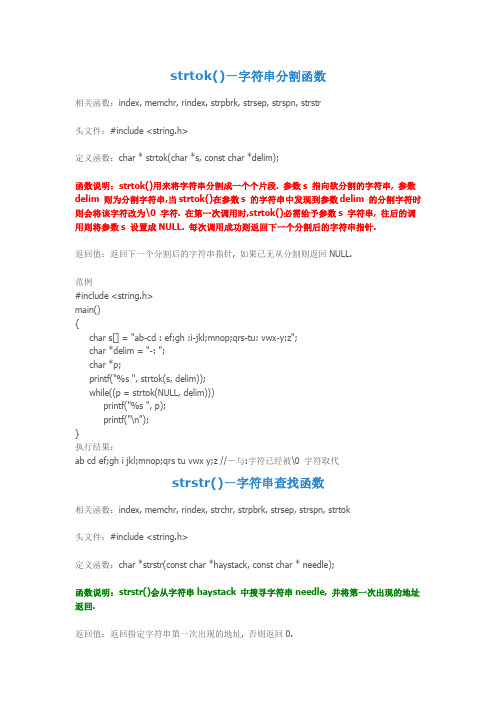
strtok()—字符串分割函数相关函数:index, memchr, rindex, strpbrk, strsep, strspn, strstr头文件:#include <string.h>定义函数:char * strtok(char *s, const char *delim);函数说明:strtok()用来将字符串分割成一个个片段. 参数s 指向欲分割的字符串, 参数delim 则为分割字符串,当strtok()在参数s 的字符串中发现到参数delim 的分割字符时则会将该字符改为\0 字符. 在第一次调用时,strtok()必需给予参数s 字符串, 往后的调用则将参数s 设置成NULL. 每次调用成功则返回下一个分割后的字符串指针.返回值:返回下一个分割后的字符串指针, 如果已无从分割则返回NULL.范例#include <string.h>main(){char s[] = "ab-cd : ef;gh :i-jkl;mnop;qrs-tu: vwx-y;z";char *delim = "-: ";char *p;printf("%s ", strtok(s, delim));while((p = strtok(NULL, delim)))printf("%s ", p);printf("\n");}执行结果:ab cd ef;gh i jkl;mnop;qrs tu vwx y;z //-与:字符已经被\0 字符取代strstr()—字符串查找函数相关函数:index, memchr, rindex, strchr, strpbrk, strsep, strspn, strtok头文件:#include <string.h>定义函数:char *strstr(const char *haystack, const char * needle);函数说明:strstr()会从字符串haystack 中搜寻字符串needle, 并将第一次出现的地址返回.返回值:返回指定字符串第一次出现的地址, 否则返回0.范例#include <string.h>main(){char * s = "012345678901234567890123456789";char *p;p = strstr(s, "901");printf("%s\n", p);}执行结果:9.01E+21strspn()—字符查找函数相关函数:strcspn, strchr, strpbrk, strsep, strstr头文件:#include <string.h>定义函数:size_t strspn(const char *s, const char * accept);函数说明:strspn()从参数s 字符串的开头计算连续的字符, 而这些字符都完全是accept 所指字符串中的字符.简单的说, 若strspn()返回的数值为n, 则代表字符串s 开头连续有n 个字符都是属于字符串accept 内的字符.返回值:返回字符串s 开头连续包含字符串accept 内的字符数目.范例#include <string.h>main(){char *str = "Linux was first developed for 386/486-based PCs. ";char *t1 = "abcdefghijklmnopqrstuvwxyzABCDEFGHIJKLMNOPQRSTUVWXYZ";printf("%d\n", strspn(str, t1));}执行结果:5 //计算大小写字母. 不包含" ", 所以返回Linux 的长度.strrchr()—定位字符串中最后出现的指定字符相关函数:index, memchr, rindex, strpbrk, strsep, strspn, strstr, strtok头文件:#include <string.h>定义函数:char * strrchr(const char *s, int c);函数说明:strrchr()用来找出参数s 字符串中最后一个出现的参数c 地址, 然后将该字符出现的地址返回.返回值:如果找到指定的字符则返回该字符所在地址, 否则返回0.范例#include <string.h>main(){char *s = "0123456789012345678901234567890";char *p;p = strrchr(s, '5');printf("%s\n", p);}执行结果:567890strpbrk()—定位字符串中第一个出现的指定字符相关函数:index, memchr, rindex, strpbrk, strsep, strspn, strstr, strtok头文件:#include <include.h>定义函数:char *strpbrk(const char *s, const char *accept);函数说明:strpbrk()用来找出参数s 字符串中最先出现存在参数accept 字符串中的任意字符.返回值:如果找到指定的字符则返回该字符所在地址, 否则返回0.范例#include <string.h>main(){char *s = "0123456789012345678901234567890";char *p; p = strpbrk(s, "a1 839"); //1 会最先在s 字符串中找到printf("%s\n", p);p = strprk(s, "4398"); //3 会最先在s 字符串中找到printf("%s\n", p);}执行结果:1.23E+29strncat()—字符串连接函数相关函数:bcopy, memccpy, memecpy, strcpy, strncpy头文件:#inclue <string.h>定义函数:char * strncat(char *dest, const char *src, size_t n);函数说明:strncat()会将参数src 字符串拷贝n 个字符到参数dest 所指的字符串尾. 第一个参数dest 要有足够的空间来容纳要拷贝的字符串.返回值:返回参数dest 的字符串起始地址.范例#include <string.h>main(){char a[30] = "string(1)";char b[] = "string(2)";printf("before strncat() :%s\n", a);printf("after strncat() :%s\n", strncat(a, b, 6));}执行结果:before strncat() : string(1)after strncat() : string(1) stringstrncpy()—复制字符串相关函数:bcopy, memccpy, memcpy, memmove头文件:#include <string.h>定义函数:char * strncpy(char *dest, const char *src, size_t n);函数说明:strncpy()会将参数src 字符串拷贝前n 个字符至参数dest 所指的地址.返回值:返回参数dest 的字符串起始地址.范例#inclue <string.h>main(){char a[30] = "string(1)";char b[] = "string(2)";printf("before strncpy() : %s\n", a);printf("after strncpy() : %s\n", strncpy(a, b, 6));}执行结果:before strncpy() : string(1)after strncpy() : string(1)strncasecmp()—字符串比较函数(忽略大小写)相关函数:bcmp, memcmp, strcmp, strcoll, strncmp头文件:#include <string.h>定义函数:int strncasecmp(const char *s1, const char *s2, size_t n);函数说明:strncasecmp()用来比较参数s1 和s2 字符串前n 个字符, 比较时会自动忽略大小写的差异.返回值:若参数s1 和s2 字符串相同则返回0. s1 若大于s2 则返回大于0 的值, s1 若小于s2 则返回小于0 的值.范例#include <string.h>main(){char *a = "aBcDeF";char *b = "AbCdEf";if(!strncasecmp(a, b))printf("%s =%s\n", a, b);}执行结果:aBcDef=AbCdEfstrlen()—字符串长度计算函数相关函数:无头文件:#include <string.h>定义函数:size_t strlen (const char *s);函数说明:strlen()用来计算指定的字符串s 的长度, 不包括结束字符"\0".返回值:返回字符串s 的字符数.范例:/*取得字符串str 的长度*/#include <string.h>main(){char *str = "12345678";printf("str length = %d\n", strlen(str));}执行结果:str length = 8strdup()—复制字符串相关函数:calloc, malloc, realloc, free头文件:#include <string.h>定义函数:char * strdup(const char *s);函数说明:strdup()会先用maolloc()配置与参数s 字符串相同的空间大小, 然后将参数s 字符串的内容复制到该内存地址, 然后把该地址返回. 该地址最后可以利用free()来释放.返回值:返回一字符串指针, 该指针指向复制后的新字符串地址. 若返回NULL 表示内存不足.范例#include <string.h>main(){char a[] = "strdup";char *b;b = strdup(a);printf("b[]=\"%s\"\n", b);}执行结果:b[]="strdup"strcspn()—查找字符串相关函数:strspn头文件:#inclued<string.h>定义函数:size_t strcspn(const char *s, const char * reject);函数说明:strcspn()从参数s 字符串的开头计算连续的字符, 而这些字符都完全不在参数reject 所指的字符串中. 简单地说, 若strcspn()返回的数值为n, 则代表字符串s 开头连续有n 个字符都不含字符串reject 内的字符.返回值:返回字符串s 开头连续不含字符串reject 内的字符数目.范例#include <string.h>main(){char *str = "Linux was first developed for 386/486-based pcs. ";printf("%d\n", strcspn(str, " "));printf("%d\n", strcspn(str, "/-"));printf("%d\n", strcspn(str, "1234567890"));}执行结果:5 //只计算到" "的出现, 所以返回"Linux"的长度33 //计算到出现"/"或"-", 所以返回到"6"的长度30 // 计算到出现数字字符为止, 所以返回"3"出现前的长度strcpy()—复制字符串相关函数:bcopy, memcpy, memccpy, memmove头文件:#include <string.h>定义函数:char *strcpy(char *dest, const char *src);函数说明:strcpy()会将参数src 字符串拷贝至参数dest 所指的地址.返回值:返回参数dest 的字符串起始地址.附加说明:如果参数dest 所指的内存空间不够大, 可能会造成缓冲溢出(buffer Overflow)的错误情况, 在编写程序时请特别留意, 或者用strncpy()来取代.范例#include <string.h>main(){char a[30] = "string(1)";char b[] = "string(2)";printf("before strcpy() :%s\n", a);printf("after strcpy() :%s\n", strcpy(a, b));}执行结果:before strcpy() :string(1)after strcpy() :string(2)strcoll()—字符串比较函数(按字符排列次序)相关函数:strcmp, bcmp, memcmp, strcasecmp, strncasecmp头文件:#include <string.h>定义函数:int strcoll(const char *s1, const char *s2);函数说明:strcoll()会依环境变量LC_COLLATE 所指定的文字排列次序来比较s1 和s2 字符串.返回值:若参数s1 和s2 字符串相同则返回0. s1 若大于s2 则返回大于0 的值. s1 若小于s2 则返回小于0 的值.附加说明:若LC_COLLATE 为"POSIX"或"C", 则strcoll()与strcmp()作用完全相同.范例参考strcmp().strcmp()—字符串比较函数(比较字符串)相关函数:bcmp, memcmp, strcasecmp, strncasecmp, strcoll头文件:#include <string.h>定义函数:int strcmp(const char *s1, const char *s2);函数说明:strcmp()用来比较参数s1 和s2 字符串. 字符串大小的比较是以ASCII 码表上的顺序来决定, 此顺序亦为字符的值. strcmp()首先将s1 第一个字符值减去s2 第一个字符值, 若差值为0 则再继续比较下个字符, 若差值不为0 则将差值返回. 例如字符串"Ac"和"ba"比较则会返回字符"A"(65)和'b'(98)的差值(-33).返回值:若参数s1 和s2 字符串相同则返回0. s1 若大于s2 则返回大于0 的值. s1 若小于s2 则返回小于0 的值.范例#include <string.h>main(){char *a = "aBcDeF";char *b = "AbCdEf";char *c = "aacdef";char *d = "aBcDeF";printf("strcmp(a, b) : %d\n", strcmp(a, b));printf("strcmp(a, c) : %d\n", strcmp(a, c));printf("strcmp(a, d) : %d\n", strcmp(a, d));}执行结果:strcmp(a, b) : 32strcmp(a, c) :-31strcmp(a, d) : 0strchr()—字符串查找函数(返回首次出现字符的位置) 相关函数:index, memchr, rinex, strbrk, strsep, strspn, strstr, strtok头文件:#include <string.h>定义函数:char * strchr (const char *s, int c);函数说明:strchr()用来找出参数s 字符串中第一个出现的参数c 地址, 然后将该字符出现的地址返回.返回值:如果找到指定的字符则返回该字符所在地址, 否则返回0.范例#include <string.h>main(){char *s = "0123456789012345678901234567890";char *p;p = strchr(s, '5');printf("%s\n", p);}执行结果:5.68E+25strcat()—连接字符串相关函数:bcopy, memccpy, memcpy, strcpy, strncpy头文件:#include <string.h>定义函数:char *strcat(char *dest, const char *src);函数说明:strcat()会将参数src 字符串拷贝到参数dest 所指的字符串尾. 第一个参数dest 要有足够的空间来容纳要拷贝的字符串.返回值:返回参数dest 的字符串起始地址范例#include <string.h>main(){char a[30] = "string(1)";char b[] = "string(2)";printf("before strcat() : %s\n", a);printf("after strcat() : %s\n", strcat(a, b));}执行结果:before strcat() : string(1)after strcat() : string(1)string(2)strcasecmp()—字符串比较函数(忽略大小写比较字符串) 相关函数:bcmp, memcmp, strcmp, strcoll, strncmp头文件:#include <string.h>定义函数:int strcasecmp (const char *s1, const char *s2);函数说明:strcasecmp()用来比较参数s1 和s2 字符串, 比较时会自动忽略大小写的差异.返回值:若参数s1 和s2 字符串相同则返回0. s1 长度大于s2 长度则返回大于0 的值, s1 长度若小于s2 长度则返回小于0 的值.范例#include <string.h>main(){char *a = "aBcDeF";char *b = "AbCdEf";if(!strcasecmp(a, b))printf("%s=%s\n", a, b);}执行结果:aBcDeF=AbCdEfrindex()—字符串查找函数(返回最后一次出现的位置)相关函数:index, memchr, strchr, strrchr头文件:#include <string.h>定义函数:char * rindex(const char *s, int c);函数说明:rindex()用来找出参数s 字符串中最后一个出现的参数c 地址, 然后将该字符出现的地址返回. 字符串结束字符(NULL)也视为字符串一部分.返回值:如果找到指定的字符则返回该字符所在的地址, 否则返回0.范例#include <string.h>main(){char *s = "0123456789012345678901234567890";char *p;p = rindex(s, '5');printf("%s\n", p);}执行结果:567890index()—字符串查找函数(返回首次出现的位置)相关函数:rindex, srechr, strrchr头文件:#include <string.h>定义函数:char * index(const char *s, int c);函数说明:index()用来找出参数s 字符串中第一个出现的参数c 地址, 然后将该字符出现的地址返回. 字符串结束字符(NULL)也视为字符串一部分.返回值:如果找到指定的字符则返回该字符所在地址, 否则返回0.范例#include <string.h>main(){char *s = "0123456789012345678901234567890";char *p;p = index(s, '5');printf("%s\n", p);}执行结果:5.68E+25toupper()—字符串转换函数(小写转大写)相关函数:isalpha, tolower头文件:#include <ctype.h>定义函数:int toupper(int c);函数说明:若参数 c 为小写字母则将该对应的大写字母返回.返回值:返回转换后的大写字母, 若不须转换则将参数c 值返回.范例/* 将s 字符串内的小写字母转换成大写字母*/#include <ctype.h>main(){char s[] = "aBcDeFgH12345;!#$";int i;printf("before toupper() : %s\n", s);for(i = 0; I < sizeof(s); i++)s[i] = toupper(s[i]);printf("after toupper() : %s\n", s);}执行结果:before toupper() : aBcDeFgH12345;!#$after toupper() : ABCDEFGH12345;!#$tolower()—字符串转换函数(大写转小写)作相关函数:isalpha, toupper头文件:#include <stdlib.h>定义函数:int tolower(int c);函数说明:若参数 c 为大写字母则将该对应的小写字母返回.返回值:返回转换后的小写字母, 若不须转换则将参数c 值返回.范例/* 将s 字符串内的大写字母转换成小写字母*/#include <ctype.h>main(){char s[] = "aBcDeFgH12345;!#$";int i;printf("before tolower() : %s\n", s);for(i = 0; I < sizeof(s); i++)s[i] = tolower(s[i]);printf("after tolower() : %s\n", s);}执行结果:before tolower() : aBcDeFgH12345;!#$after tolower() : abcdefgh12345;!#$toascii()—将整数转换成合法的ASCII码字符相关函数:isascii, toupper, tolower头文件:#include <ctype.h>定义函数:int toascii(int c);函数说明:toascii()会将参数c 转换成7 位的unsigned char 值, 第八位则会被清除, 此字符即会被转成ASCII码字符.返回值:将转换成功的ASCII 码字符值返回.范例/* 将int 型a 转换成ASSII 码字符*/#include <stdlib.h>main(){int a = 217;char b;printf("before toascii() : a value =%d(%c)\n", a, a);b = toascii(a);printf("after toascii(): a value =%d(%c)\n", b, b);}执行结果:before toascii() : a value =217()after toascii() : a value =89(Y)strtoul()—将字符串转换成无符号长整型数相关函数:atof, atoi, atol, strtod, strtol头文件:#include <stdlib.h>定义函数:unsigned long int strtoul(const char *nptr, char **endptr, int base);函数说明:strtoul()会将参数nptr 字符串根据参数base 来转换成无符号的长整型数。
(完整版)C语言字符串操作总结大全(超详细)
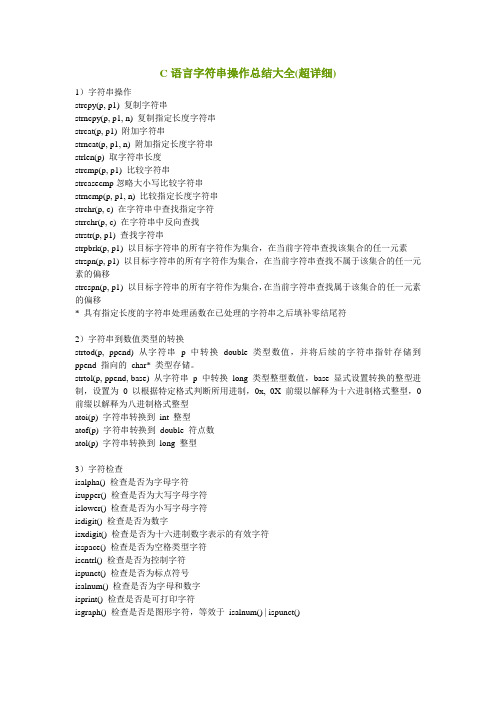
例程:
#include <iostream.h>
#include <string.h>
void main(void)
{
char str1[] = { "Tsinghua "};
char str2[] = { "Computer"};
cout <<strcpy(str1,str2)<<endl;
strncpy(char destination[], const char source[], int numchars);
strncpy:将字符串source中前numchars个字符拷贝到字符串destination中。
strncpy函数应用举例
原型:strncpy(char destination[], const char source[], int numchars);
C语言字符串操作总结大全(超详细)
1)字符串操作
strcpy(p, p1)复制字符串
strncpy(p, p1, n)复制指定长度字符串
strcat(p, p1)附加字符串
strncat(p, p1, n)附加指定长度字符串
strlen(p)取字符串长度
strcmp(p, p1)比较字符串
strcasecmp忽略大小写比较字符串
查找字串string中首次出现的位置, NULL结束符也包含在查找中.返回一个指针,指向字符c在字符串string中首次出现的位置,如果没有找到,则返回NULL.
char *strrchr(const char *string, int c);
string在c语言中的用法

string在c语言中的用法字符串是一种重要的数据类型,它在C语言中有很多的应用。
在C语言中,字符串是由char类型的字符数组来实现的。
每个字符都占用一个字节,以\0作为字符串的结束标志。
字符串的定义:字符串的定义方式为:char str[]=”Hello World”;其中,str是一个字符数组,用于存储字符串,“Hello World”是字符串字面值。
由于字符串需要以\0作为结束标志,因此在定义字符串时,必须保证字符串后面有一个\0。
字符串的输入输出:字符串的输入输出可以使用库函数puts和gets。
其中,puts用于输出字符串,gets用于输入字符串。
puts(str) 输出字符串strgets(str) 输入字符串str字符串的长度:在C语言中,可以使用strlen函数来计算字符串的长度。
strlen函数用于计算字符串的字符个数,不包括字符串末尾的\0。
例如,strlen("hello")的返回值为5。
字符串的复制:在C语言中,可以使用strcpy函数来复制字符串。
strcpy函数用于将一个字符串复制到另一个字符串中。
例如,strcpy(dest, src)表示将src复制到dest中。
字符串的比较:在C语言中,可以使用strcmp函数来比较两个字符串的大小。
strcmp函数用于比较两个字符串的大小,根据比较结果返回一个整数。
如果第一个字符串小于第二个字符串,返回负数;如果第一个字符串等于第二个字符串,返回0;如果第一个字符串大于第二个字符串,返回正数。
例如,strcmp("hello", "world")的返回值为负数。
字符串的连接:在C语言中,可以使用strcat函数来连接两个字符串。
strcat函数用于将一个字符串连接到另一个字符串的后面。
例如,strcat(dest, src)表示将src连接到dest的后面。
字符串的查找:在C语言中,可以使用strstr函数来查找字符串。
c语言delchar函数用法
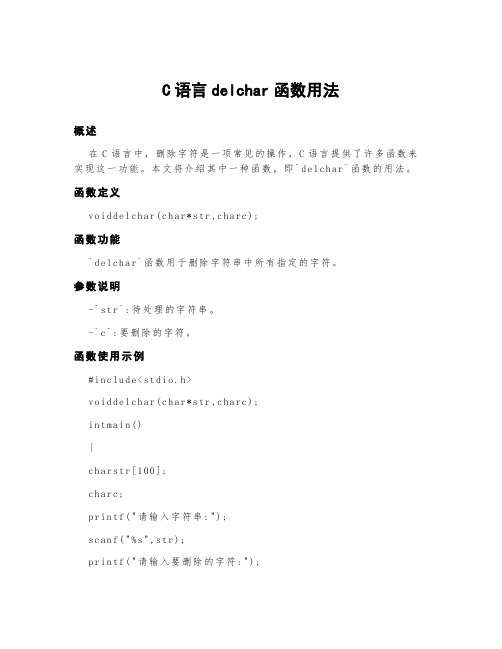
C语言delchar函数用法概述在C语言中,删除字符是一项常见的操作,C语言提供了许多函数来实现这一功能。
本文将介绍其中一种函数,即`d el ch ar`函数的用法。
函数定义v o id de lc ha r(ch ar*s tr,c ha rc);函数功能`d el ch ar`函数用于删除字符串中所有指定的字符。
参数说明-`st r`:待处理的字符串。
-`c`:要删除的字符。
函数使用示例#i nc lu de<s td io.h>v o id de lc ha r(ch ar*s tr,c ha rc);i n tm ai n(){c h ar st r[100];c h ar c;p r in tf("请输入字符串:");s c an f("%s",s tr);p r in tf("请输入要删除的字符:");s c an f("%c",&c);d e lc ha r(st r,c);p r in tf("删除指定字符后的字符串为:%s\n",st r);r e tu rn0;}v o id de lc ha r(ch ar*s tr,c ha rc){i n ti,j;f o r(i=0,j=0;st r[i]!='\0';i++){i f(s tr[i]!=c){s t r[j]=s tr[i];j++;}}s t r[j]='\0';}函数实现原理`d el ch ar`函数通过遍历字符串的每一个字符,将不是指定字符的字符保存在原字符串中。
最后在新的字符串末尾添加一个终止符号`\0`表示字符串的结束。
示例说明假设输入的字符串为`"he ll ow or ld"`,要删除的字符为`'l'`,则经过`de lc ha r`函数处理后,新的字符串将变为`"he ow or d"`。
c语言标准库中的函数名
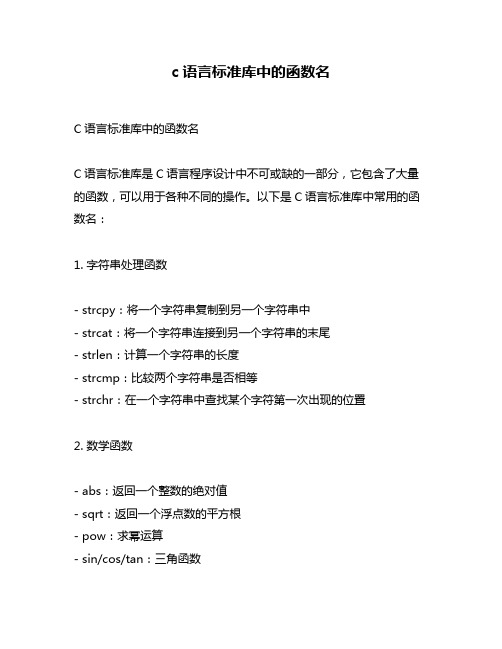
c语言标准库中的函数名
C语言标准库中的函数名
C语言标准库是C语言程序设计中不可或缺的一部分,它包含了大量的函数,可以用于各种不同的操作。
以下是C语言标准库中常用的函数名:
1. 字符串处理函数
- strcpy:将一个字符串复制到另一个字符串中
- strcat:将一个字符串连接到另一个字符串的末尾
- strlen:计算一个字符串的长度
- strcmp:比较两个字符串是否相等
- strchr:在一个字符串中查找某个字符第一次出现的位置
2. 数学函数
- abs:返回一个整数的绝对值
- sqrt:返回一个浮点数的平方根
- pow:求幂运算
- sin/cos/tan:三角函数
3. 文件操作函数
- fopen/fclose:打开/关闭文件
- fread/fwrite:读取/写入文件数据
- fseek/ftell:移动文件指针/获取当前指针位置
4. 内存操作函数
- malloc/free:动态分配/释放内存空间
- memset/memcpy:设置/复制内存内容
5. 时间日期函数
- time:获取当前时间戳
- localtime/gmtime:将时间戳转换为本地时间/协调世界时(UTC)时间格式
- strftime:格式化输出时间日期信息
以上是C语言标准库中常用的一些函数名,当然还有很多其他的函数,需要根据具体需求选择使用。
在编写C语言程序时,熟练掌握这些函
数的用法可以提高编程效率和代码质量。
c语言字符串复制函数
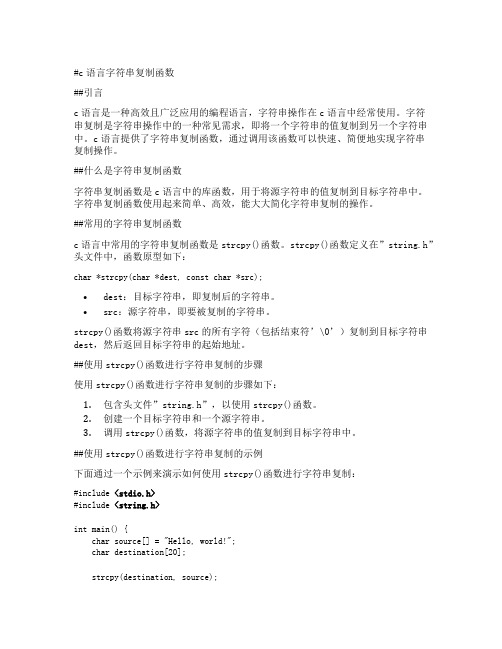
#c语言字符串复制函数##引言c语言是一种高效且广泛应用的编程语言,字符串操作在c语言中经常使用。
字符串复制是字符串操作中的一种常见需求,即将一个字符串的值复制到另一个字符串中。
c语言提供了字符串复制函数,通过调用该函数可以快速、简便地实现字符串复制操作。
##什么是字符串复制函数字符串复制函数是c语言中的库函数,用于将源字符串的值复制到目标字符串中。
字符串复制函数使用起来简单、高效,能大大简化字符串复制的操作。
##常用的字符串复制函数c语言中常用的字符串复制函数是strcpy()函数。
strcpy()函数定义在”string.h”头文件中,函数原型如下:char *strcpy(char *dest, const char *src);•dest:目标字符串,即复制后的字符串。
•src:源字符串,即要被复制的字符串。
strcpy()函数将源字符串src的所有字符(包括结束符’\0’)复制到目标字符串dest,然后返回目标字符串的起始地址。
##使用strcpy()函数进行字符串复制的步骤使用strcpy()函数进行字符串复制的步骤如下:1.包含头文件”string.h”,以使用strcpy()函数。
2.创建一个目标字符串和一个源字符串。
3.调用strcpy()函数,将源字符串的值复制到目标字符串中。
##使用strcpy()函数进行字符串复制的示例下面通过一个示例来演示如何使用strcpy()函数进行字符串复制:#include <stdio.h>#include <string.h>int main() {char source[] = "Hello, world!";char destination[20];strcpy(destination, source);printf("Source string: %s\n", source);printf("Destination string: %s\n", destination);return 0;}在上述示例中,先定义了一个源字符串source和一个目标字符串destination。
C语言中函数名
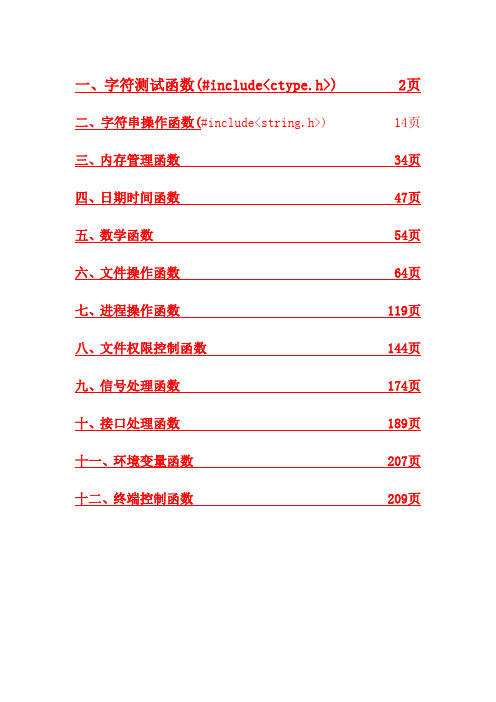
写文件函数(将数据流写入文件中)
ftell()
取得文件流的读取位置
fseek()
移动文件流的读写位置
freopen()
打开文件函数,并获得文件句柄
fread()
读文件函数(从文件流读取数据)
fputs()
写文件函数(将一指定的字符串写入文件内)
fputc()
写文件函数(将一指定字符写入文件流中)
设置程序正常结束前调用的函数
八、文件权限控制函数
utimes()
修改文件的存取时间和更改时间
utime()
修改文件的存取时间和更改时间
unlink()
删除文件
umask()
设置建立新文件时的权限遮罩
truncate()
改变文件大小
telldir()
取得目录流的读取位置
symlink()
建立文件符号连接
link()
建立文件连接
getcwd()
取得当前的工作目录
ftruncate()
改变文件大小
fstat()
由文件描述词取得文件状态
fchown()
改变文件的所有者
fchmod()
改变文件的权限
fchmod()
修改文件的权限
fchdir()
改变当前工作目录
closedir()
关闭目录
chroot()
改变文件根目录
二、字符串操作函数(#include<string.h>)
strtok()
字符串分割函数
strstr()
字符串查找函数
strspn()
字符查找函数
strrchr()
定位字符串中最后出现的指定字符
- 1、下载文档前请自行甄别文档内容的完整性,平台不提供额外的编辑、内容补充、找答案等附加服务。
- 2、"仅部分预览"的文档,不可在线预览部分如存在完整性等问题,可反馈申请退款(可完整预览的文档不适用该条件!)。
- 3、如文档侵犯您的权益,请联系客服反馈,我们会尽快为您处理(人工客服工作时间:9:00-18:30)。
7.函数名: strcspn 功 能: 在串中查找第一个给定字符集内容的段 用 法: int strcspn(char *str1, char *str2); 程序例: #i nclude <stdio.h> #i nclude <string.h> #i nclude <alloc.h> int main(void) { char *string1 = "1234567890"; char *string2 = "747DC8"; int length;
printf("buffer 2 is greater than buffer 1\n"); if (ptr < 0)
printf("buffer 2 is less than buffer 1\n"); if (ptr == 0)
printf("buffer 2 equals buffer 1\n"); return 0; }
printf("buffer 2 is less than buffer 1\n"); if (ptr == 0)
printf("buffer 2 equals buffer 1\n"); return 0; }
14.函数名: strncpy 功 能: 串拷贝 用 法: char *strncpy(char *destin, char *source, int maxlen); 程序例: #i nclude <stdio.h> #i nclude <string.h> int main(void) {
char *buf1 = "BBB", *buf2 = "bbb"; int ptr; ptr = strcmpi(buf2, buf1); if (ptr > 0)
printf("buffer 2 is greater than buffer 1\n"); if (ptr < 0)
printf("buffer 2 is less than buffer 1\n"); if (ptr == 0)
char *buf1 = "BBB", *buf2 = "bbb"; int ptr; ptr = stricmp(buf2, buf1); if (ptr > 0)
printf("buffer 2 is greater than buffer 1\n"); if (ptr < 0)
printf("buffer 2 is less than buffer 1\n"); if (ptr == 0)
printf("buffer 2 is greater than buffer 1\n"); else
printf("buffer 2 is less than buffer 1\n"); ptr = strncmp(buf2,buf3,3);
if (ptr > 0) printf("buffer 2 is greater than buffer 3\n");
11.函数名: strcmpi 功 能: 将一个串与另一个比较, 不管大小写 用 法: int strcmpi(char *str1, char *str2); 程序例: #i nclude <string.h>
#i nclude <stdio.h> int main(void) {
char *buf1 = "BBB", *buf2 = "bbb"; int ptr; ptr = strcmpi(buf2, buf1); if (ptr > 0)
strcpy(destination, Borland); strcat(destination, blank); strcat(destination, c); printf("%s\n", destination); return 0; }
3.函数名: strchr 功 能: 在一个串中查找给定字符的第一个匹配之处\ 用 法: char *strchr(char *str, char c); 程序例: #i nclude <string.h> #i nclude <stdio.h> int main(void) { char string[15]; char *ptr, c = 'r';
dup_str = strdup(string);
printf("%s\n", dup_str); free(dup_ str);
return 0; }
9.函数名: stricmp 功 能: 以大小写不敏感方式比较两个串 用 法: int stricmp(char *str1, char *str2); 程序例: #i nclude <string.h> #i nclude <stdio.h> int main(void) {
printf("buffer 2 equals buffer 1\n"); return 0;
}
6.函数名: strcpy 功 能: 串拷贝 用 法: char *strcpy(char *str1, char *str2); 程序例: #i nclude <stdio.h> #i nclude <string.h> int main(void) { char string[10]; char *str1 = "abcdefghi";
char string[10]; char *str1 = "abcdefghi";
stpcpy(string, str1); printf("%s\n", string); return 0; }
2.函数名: strcat 功 能: 字符串拼接函数 用 法: char *strcat(char *destin, char *source); 程序例: #i nclude <string.h> #i nclude <stdio.h> int main(void) { char destination[25]; char *blank = " ",*c = "C++", *Borland = "Borland";
else printf("buffer 2 is less than buffer 3\n");
return(0); }
13.函数名: strncmpi 功 能: 把串中的一部分与另一串中的一部分比较, 不管大小写 用 法: int strncmpi(char *str1, char *str2); 程序例: #i nclude <string.h>
12.函数名: strncmp 功 能: 串比较 用 法: int strncmp(char *str1, char *str2, int maxlen); 程序例: #i nclude <string.h> #i nclude <stdio.h> int main(void) {
char *buf1 = "aaabbb", *buf2 = "bbbccc", *buf3 = "ccc"; int ptr; ptr = strncmp(buf2,buf1,3); if (ptr > 0)
printf("buffer 2 equals buffer 1\n"); return 0; }
10.函数名: strerror 功 能: 返回指向错误信息字符串的指针 用 法: char *strerror(int errnum); 程序例: #i nclude <stdio.h> #i nclude <errno.h> int main(void) { char *buffer; buffer = strerror(errno); printf("Error: %s\n", buffer); return 0; }
C 语言字符串操作函数 1.函数名: strcpy 功 能: 拷贝一个字符串到另一个字符串 用 法: char *strcpy(char *destin, char *source); 程序例: #i nclude <stdio.h> #i nclude <string.h> int main(void) {
ptr = strcmp(buf2, buf1); if (ptr > 0) printf("buffer 2 is greater than buffer 1\n"); else printf("buffer 2 is less t han buffer 1\n");
ptr = strcmp(buf2, buf3); if (ptr > 0) printf("buffer 2 is greater than buffer 3\n"); else printf("buffer 2 is less t han buffer 3\n");
strcpy(string, "This is a string"); ptr = strchr(string, c); if (ptr) printf("The character %c is at position: %d\n", c, ptr-string); else
